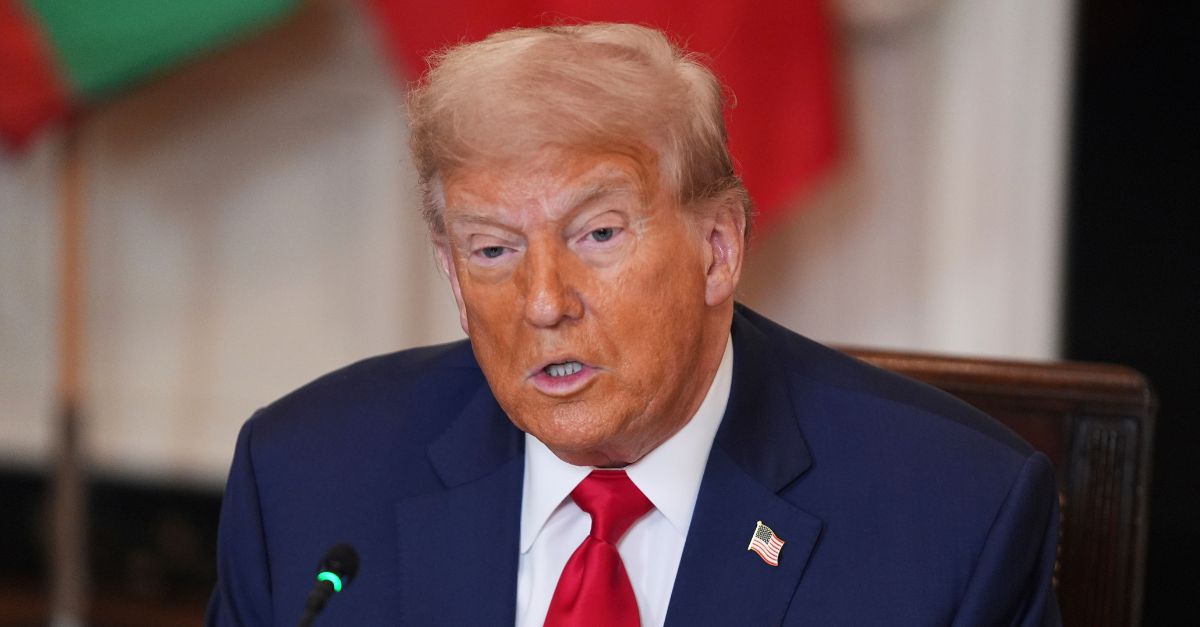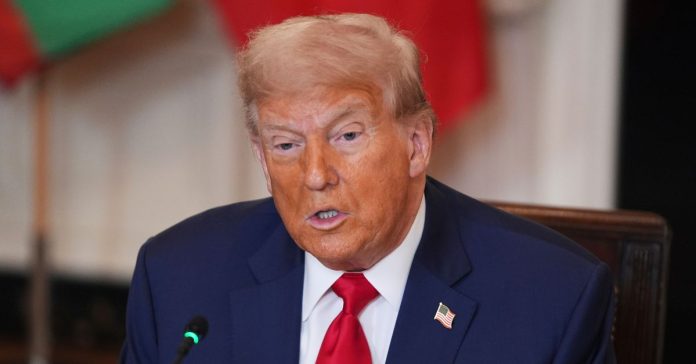
President Donald Trump speaks during a lunch with African leaders in the State Dining Room of the White House, Wednesday, July 9, 2025, in Washington (AP Photo/Evan Vucci).
President Donald Trump has suffered a significant loss in a federal court of appeals over his power to impose unilateral tariffs.
On Friday, the U.S. Court of Appeals for the Federal Circuit, in a 127-page opinion, ruled the president does not have the power to impose tariffs under the International Emergency Economic Powers Act (IEEPA).
“[I]n each statute delegating tariff power to the President, Congress has provided specific substantive limitations and procedural guidelines to be followed in imposing any such tariffs,” the majority opinion reads. “It seems unlikely that Congress intended, in enacting IEEPA, to depart from its past practice and grant the President unlimited authority to impose tariffs. The statute neither mentions tariffs (or any of its synonyms) nor has procedural safeguards that contain clear limits on the President”s power to impose tariffs.”
But the 45th and 47th president quickly vowed to appeal the loss to the perhaps friendlier terrain of the U.S. Supreme Court.
Love true crime? Sign up for our newsletter, The Law&Crime Docket, to get the latest real-life crime stories delivered right to your inbox.
“Today a Highly Partisan Appeals Court incorrectly said that our Tariffs should be removed, but they know the United States of America will win in the end,” Trump wrote in a post on Truth Social on Friday evening. “If these Tariffs ever went away, it would be a total disaster for the Country. It would make us financially weak, and we have to be strong. The U.S.A. will no longer tolerate enormous Trade Deficits and unfair Tariffs and Non Tariff Trade Barriers imposed by other Countries, friend or foe, that undermine our Manufacturers, Farmers, and everyone else. If allowed to stand, this Decision would literally destroy the United States of America.”
In mid-April, V.O.S. Selections, an alcohol importer, along with other businesses, filed a lawsuit against the tariffs regime – alleging general tumult with pricing, shipping, product selection, inventory levels, reduction in cash flow, and reduction in purchase orders. In late April, a coalition of 12 Democratic Party-led states filed a separate and similar challenge to Trump’s tariffs. The cases were later consolidated.
In late May, the consolidated plaintiffs won the argument – securing a formal kibosh on the tariffs by a unanimous three-judge panel on the Court of International Trade. But in real terms, that ruling was immediately stayed by a 10-judge panel on the appellate court.
Now, the panel, made up of 11 judges and almost the court’s entirety – except for U.S. Circuit Judge Pauline Newman who is disallowed from serving in her duties due to allegations of severe cognitive decline – has vindicated the lower court’s decision.
But, again, in real terms, the tariffs regime moves forward because the appellate court stayed application of its own ruling until Oct. 14.
This concomitant pause will allow both the Trump administration to immediately appeal – as well as give the New York City-based trade court an opportunity to consider, on remand, whether or not its “universal injunction comports with the standards outlined” in the high court’s landmark decision on the reach of district court injunctions.
Earlier this year, a majority of justices voted to narrow down the pathways to nationwide, or universal, injunctions.
But the appellate court left little room for the lower court.
“[V]acatur of the universal injunction is warranted based on the Supreme Court’s intervening decision in Trump v. CASA, Inc.,” the opinion goes on. “In CASA, the Supreme Court considered the Government’s challenge to three universal injunctions issued by different district courts prohibiting enforcement of the President’s policy with respect to birthright citizenship.”
In the present case, the 7-4 majority on the panel agreed with the legal reasoning and conclusions reached by the trade court.
“We are not addressing whether the President’s actions should have been taken as a matter of policy,” the opinion continues. “Nor are we deciding whether IEEPA authorizes any tariffs at all. Rather, the only issue we resolve on appeal is whether the Trafficking Tariffs and Reciprocal Tariffs imposed by the Challenged Executive Orders are authorized by IEEPA. We conclude they are not.”
To hear the appellate court tell it, the text of the statute at issue strongly advises against the government’s interpretation.
“The statute bestows significant authority on the President to undertake a number of actions in response to a declared national emergency, but none of these actions explicitly include the power to impose tariffs, duties, or the like, or the power to tax,” the opinion reads. “The Government locates that authority within the term ‘regulate . . . importation,’ but it is far from plain that ‘regulate . . . importation,’ in this context, includes the power to impose the tariffs at issue in this case.”
The appeals panel did not stop with the statute’s interpretation at the basic level. The panel further explored the government’s arguments about the power the president claimed – and found those arguments particularly lacking in the constitutional sense.
From the opinion, at length:
The Government’s interpretation of IEEPA would render it an unconstitutional delegation. Because taxation authority constitutionally rests with Congress, any delegation of that authority to the President must at least set out an intelligible principle that includes “both ‘the general policy'” that the President “must pursue and ‘the boundaries of [its] delegated authority.'” Similarly, Congress must “provide sufficient standards to enable both ‘the courts and the public [to] ascertain'” whether the President “has followed the law.” Because this is undoubtedly a case that “affect[s] the entire national economy,” the “‘guidance’ needed is greater . . . than when [Congress] addresses a narrow, technical issue.” For taxes, both “quantitative” and “qualitative limits on how much money” the President can raise are permissible, but it would “pose a constitutional problem” if the “statute gives the [executive branch] power, all on its own, to raise [a] hypothetical $5 trillion” with no “ceiling.”
The Government’s interpretation of IEEPA would be a functionally limitless delegation of Congressional taxation authority.

